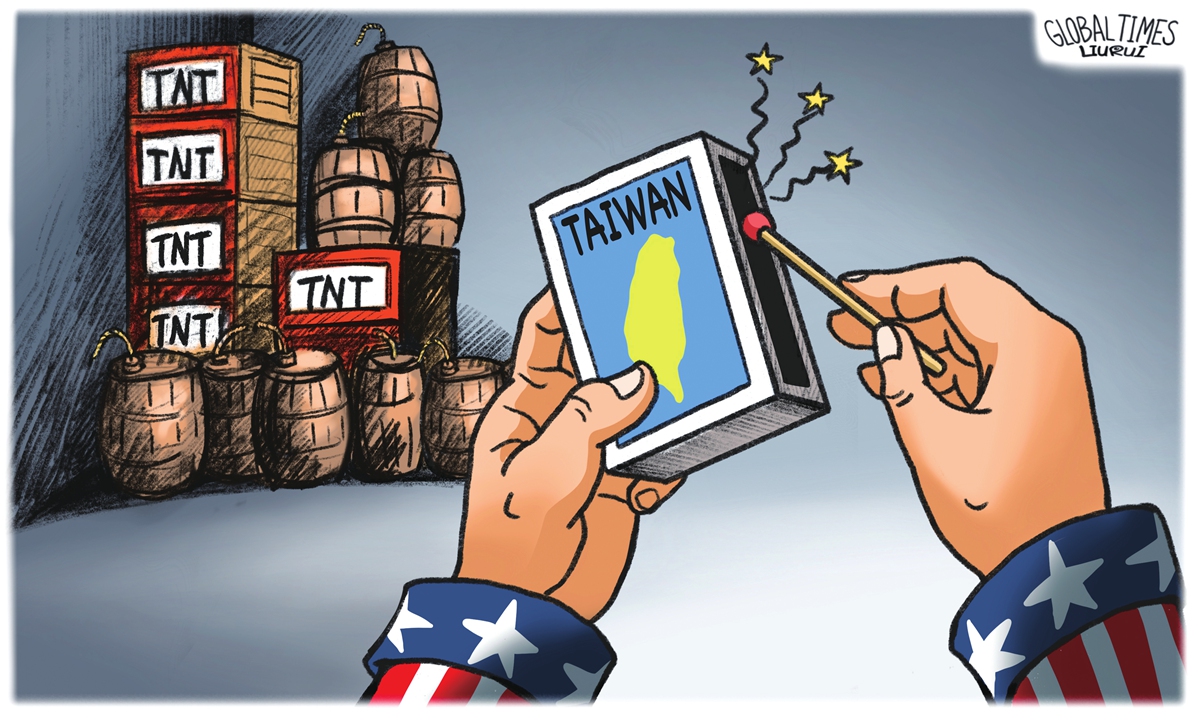
Illustration:Liu Rui/GT
The Taiwan-related bill passed by the US House of Representatives on Wednesday will only add to uncertainties across the Straits rather than what the US claims to be "efforts contributing to peace," experts said, as US Secretary of State Antony Blinken intensifies war hype by claiming China will be able to "invade" Taiwan island by 2027.
The piece of legislation, the Taiwan Assurance Implementation Act, was introduced on February 24 by Representative Ann Wagner, and was approved on Wednesday.
The bill requires US State Department to conduct periodic reviews of its guidelines for US engagement with the island of Taiwan and submit a report to Congress at least once every two years to assess if the guidelines are helpful in achieving the goal of deepening relations with Taiwan, according to media reports.
Refuting the principle that has been in place for decades - that no official interaction exists between US and Taiwan island - the bill also asks to identify opportunities to lift any remaining "self-imposed limitations" on US engagement with the island and articulate a plan to do so.
"The bill suggests that the US House intends to unilaterally change the status quo across the Straits," Yang Xiyu, a senior research fellow at the China Institute of International Studies, told Global Times on Thursday.
"For the past 40 years, the US maintained only unofficial interactions with the island, but now they are looking to shift to an official one," Yang said, "and this move will only lead to further instability rather than what they claimed as efforts contributing to peace."
In a release issued Wednesday by Wagner's office, the Republican lawmaker lashed out at the Biden administration for having put back in place many restrictions that had been previously declared null and void by former Secretary of State Mike Pompeo, and said Biden had undermined the US' ability to coordinate more closely with the island.
Experts warned that with a series of Taiwan-related bills being passed in recent years, Congress is trying to dominate Biden's policy, which is a very dangerous trend. What's more, Biden seems to be reluctant to change the fact but is instead catering to it, which makes the US' China policy even more conflicting.
On the same day, Blinken agreed with a US intelligence chief's assessment that China will be able to "invade" Taiwan island by 2027 when he appeared before the panel to testify on the State Department's 2024 budget request.
Responding to Blinken's remarks, Chinese Foreign Ministry spokesperson Wang Wenbin said on Thursday that "resolving the Taiwan question is our own matter," noting that China will make the utmost efforts to achieve peaceful reunification but will not renounce the use of force.
The root cause of the current tensions across the Taiwan Straits is the collusion between DPP authorities and some in the US, Wang noted.
"If the US truly wants peace and stability across the Straits, it should abide by the one-China principle and the provisions of the three China-US joint communiqués, deliver on US leaders' commitment of not supporting "Taiwan independence", and stop meddling in the Taiwan question and creating new tensions," Wang stressed.
Li Haidong, a professor at the Institute of International Relations at the China Foreign Affairs University, told the Global Times on Thursday that US intelligence departments have always had a tendency to exaggerate threats, and the intention behind it is very clear - the US is urging its allies to follow more tightly its Taiwan-related policies and is creating panic in the region, so that the US itself can shift the blame onto China even though they are the ones stirring up unrest in the Asia-Pacific in the first place.
At the panel, Blinken highlighted an 18 percent budget increase from 2023 in "new innovative investments" in the Indo-Pacific to "outcompete China."
Over the past 10 years, he said, the State Department has notified Congress of arms sales to the island of Taiwan totaling nearly $40 billion, with $21 billion from 2019 to the present alone, making him the Secretary of State who has signed the most arms sales to Taiwan in history, RFI reported.
Li warned Washington that incessantly provoking China over a matter of principle will only make already tense China-US relations even worse, and will close the few existing channels of communication between the two sides.




